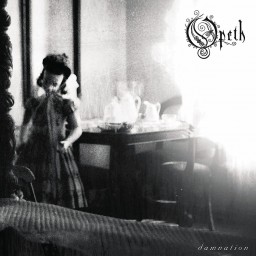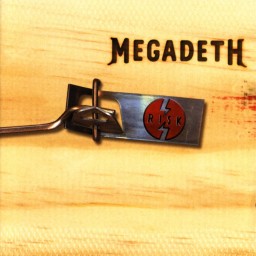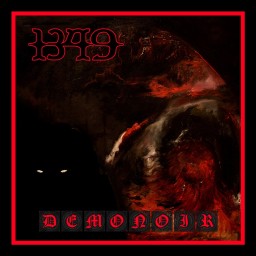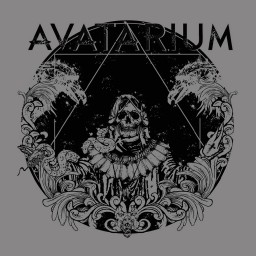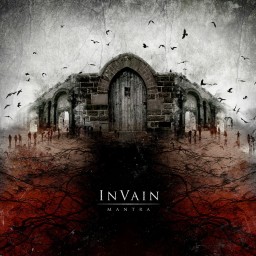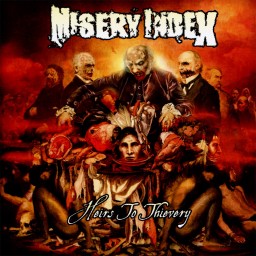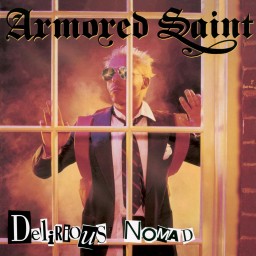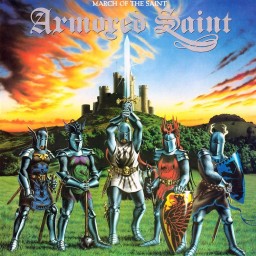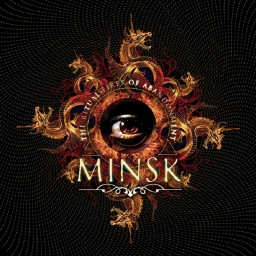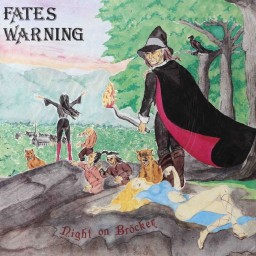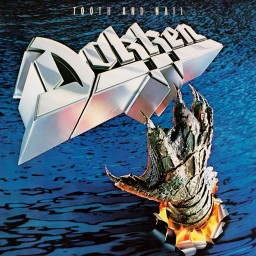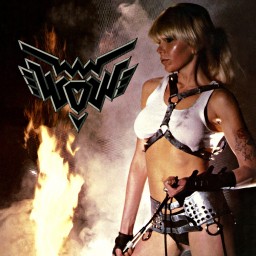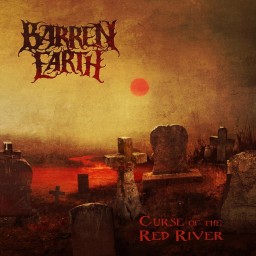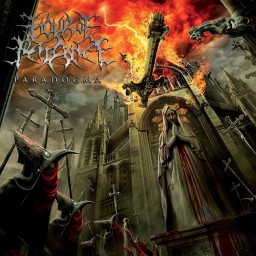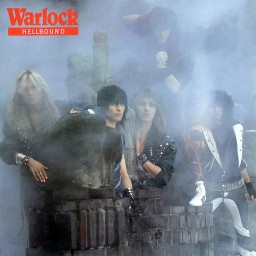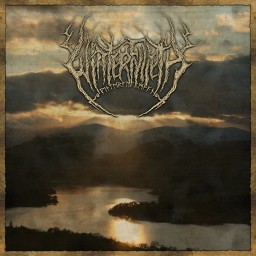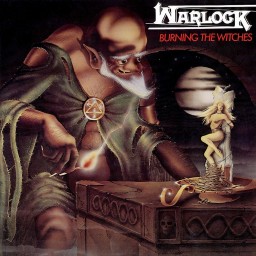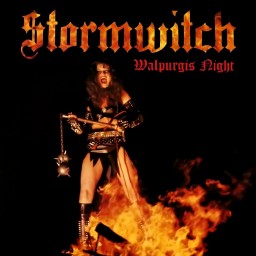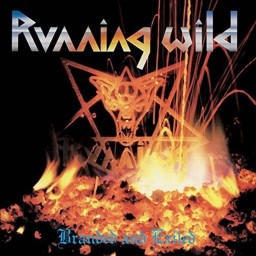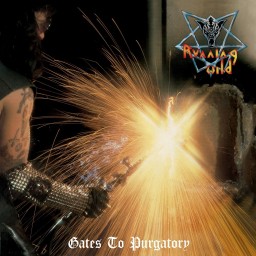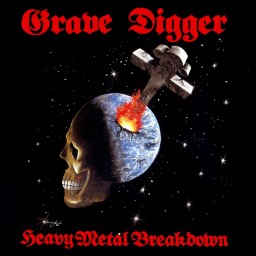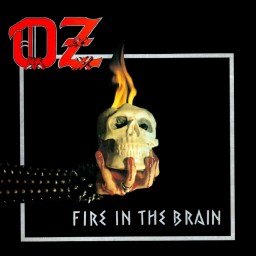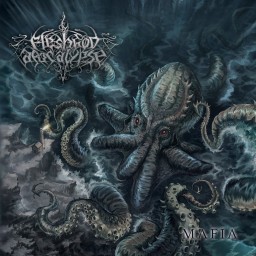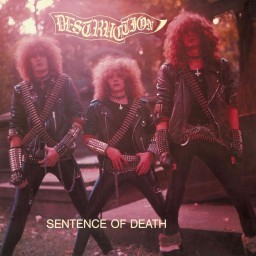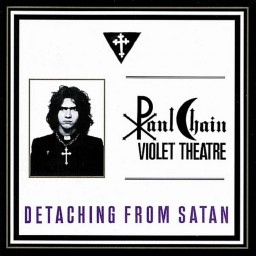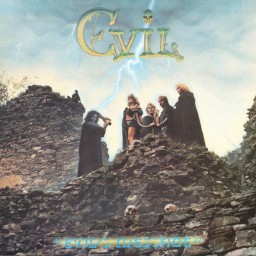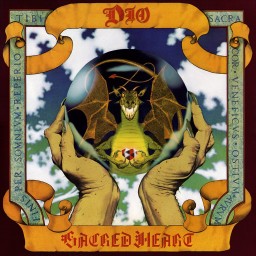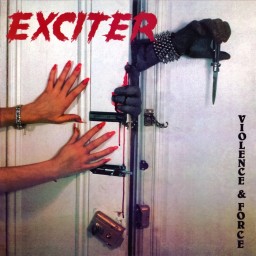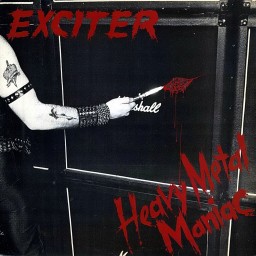Daniel's Reviews
This is the third full-length release from Chet W Scott's Seattle-based solo project Blood Of The Black Owl. It comprises of one long piece cut into four movements of deeply engaging (& mostly ritualistic) dark ambient.
Opener "Intent (Movement I)" is an epic dirge that builds slowly with delicately strummed acoustic guitars & glistening melodic overlays. It slowly envelopes the listener until it disintegrates into some tribal drums which initially seem to be a little too out of time for my liking although they are no less hypnotic. I can only assume that Chet was going for a very organic feel for the drums & decided that they sounded more authentic with the slight timing blemishes. The movement draws to an end after some beautiful pipe melodies pierce the sinister soundscape. An encouraging start to the album.
Movement II is entitled "The Statement Of Will" & it is the only piece to include any traditional metal as it blasts into some simple Celtic Frost style power chord riffs before giving way to some dark atmospheric ambience & twisted spoken word vocals. The metal section then returns with the addition of a simple clean guitar melody to close out the shortest & least impressive of the four movements. I would've been much happier if this track had been excluded & replaced with some more of the dark ambient material as it seems out of place to my ears.
"Chant Of The Captured Spirit (Movement III)" returns to the immense building dirge style & again captures me emotionally with it's power & hypnotic repetition. This sound is extremely dark & is certainly not for everyone but I can see quite a few black metal fans having the world of dark ambient opened up to them by this. The track perfectly depicts the urgency & horror of its title & ambient music does not get much bigger. This is the clear album highlight but I wouldn't put it on when the oldies are round for dinner.
"The Final Banishing (Movement IV)" brings the listener back to earth with some very minimal (not to mention beautiful) acoustic guitars & whispered spoken word for the first eight minutes before transforming into another dark tribal ritual piece. Agonizing screams chant painfully & guitar noodlings fade in & out of the swirling atmosphere.
"A Banishing Ritual" finishes with some eery & disenchanting female vocals that leave me feeling a deep sense of hopelessness. It is only after the final seconds of the album die away that you realise what a deep journey Blood Of The Black Owl have taken you on. One full of timeless ambience & ritual. It also leaves me regretting that the second movement was included to take a small amount off the gloss away from an otherwise monumental release.
Genres: Non-Metal
Format: Album
Year: 2010
After being blown away by Adrift For Days crushingly heavy debut album "The Lunar Maria" I had very high hopes for the follow-up. "Come Midnight" is certainly another quality release but it takes a different approach to the debut. The band had previously built their wall of sound upon a ridiculously heavy doom metal platform whereas this release sees them pulling things back a notch to focus on a more textured approach that draws as much on stoner metal & post-metal as it does on doom. The droney parts are still there & so are the psychedelics although they're a touch more restrained. The result is a bit less bludgeoning but also more varied & introspective. Vocally things are a bit less aggressive for the most part & I'm not sure I that enjoy this approach so much as the powerful vocals on "The Lunar Maria" were a definite highlight for me.
As with the debut, this is a 70 minute marathon but "Come Midnight" seems a bit longer due to some extended post-rock sections that can overstay their welcome at times. There are certainly some great moments & everything is put together very professionally but I think it lacks the overwhelming intensity of "The Lunar Maria". It's definitely worth a listen though. Adrift For Days are a class act & I get the feeling that they're only gonna get better.
Genres: Doom Metal Stoner Metal
Format: Album
Year: 2012
A very unsophisticated death/thrash combo playing outdated generic music fairly badly. The thrash riffs & guitar solos are especially ordinary.
Genres: Death Metal Thrash Metal
Format: Album
Year: 2010
Canadian death metallers Aeternam are hard band to describe as they don't fit snuggly into any one genre. The best I can come up with is melodic death metal with strong classic metal & oriental music influences. Black metal, thrash metal & metalcore all get a working over as well though. I can certainly hear At The Gates & Judas Priest in many parts of "Disciples Of The Unseen". The oriental influence is very obvious in the Priest-like lead guitar melodies & is what gives them their own sound to an extent. This is a good effort for their debut album. It's just not quite captivating enough to draw me back for multiple listens as it's probably a little too melodic for my taste. The snare sound could do with some work as it sounds particularly thin during the blast beast sections too.
Genres: Death Metal
Format: Album
Year: 2010
Aborted's sophomore outing was a welcome surprise after their debut album "The Purity Of Perversion" failed to impress me. "Engineering The Dead" presented a band that had improved in just about every area & in doing so had produced a high quality brutal death metal record that would appeal to most fans of the genre. The welcome move towards a cleaner sound & production lifts the songs to higher levels than they would otherwise have been capable. "Skullfuck Crescendo" is a particular favorite of mine but it's generally hard to pick out highlights as there's a consistent quality across all of this material. Don't expect Aborted to reinvent the wheel. That wasn't the intention here however it's a far cry from the blatant Suffocation/Cannibal Corpse cloning they were guilty of on the debut. Instead they've produced some solid brutal death metal that's fit for purpose & personally I find it quite a fun listen.
Genres: Death Metal
Format: Album
Year: 2001
Aborted's debut album marked a pretty uneventful start to their career. While there was certainly plenty of brutality on display, they didn't really offer the listener anything much to help distinguish themselves from the rest of the generic brutal death metal on the market at the time. The big boys of the genre had been doing this stuff better for a good few years by this stage. To my ears "The Purity Of Perversion" sits somewhere between Suffocation's "Human Waste" EP & Cannibal Corpse's "Butchered At Birth" as far as style goes. In fact, the deeper vocals are very similar to early Suffocation. The production is pretty raw but it suitably maintains the energy level of the band. I find that the quality improves a little in the back end of the album but it's hard to pick out any highlight tracks as the material tends to be a bit samey. I think most death metal fans will find something of interest here. Just not enough to warrant too many repeat listens.
Genres: Death Metal
Format: Album
Year: 1999
Sometimes a band comes along that is so cool that 95% of the population will not understand them but the other 5% will think they are gods. Harvey Milk are one of these bands. Those who understand Harvey Milk will be taken to cloud nine whereas the non-believers will be left feeling that they are incredibly dull, awkward & grating with very little to offer musically. To understand this music requires the listener to possess a minimum level of coolness. With Harvey Milk I am clearly well under the coolness level required to appreciate their undoubtedly brilliant & masterful art. This unfortunately means that my life will forever be lesser than those who are cool enough. I am condemned to wonder what the fuck this is all about and how other reviewers can find anything remotely positive to say.
Genres: Doom Metal Sludge Metal
Format: Album
Year: 2010
There's some fairly average production on this release which makes it difficult to make out what's going on & difficult to enjoy. The vocals are too far back in the mix too. The songs feature some diverse influences but they don't tend to blend very well i.e. the black metal comes crashing back in unannounced in a rude fashion after more ambient sections rather than naturally progressing. It's not all doom & gloom though. Their are some promising moments but the noisy production quickly kills them off.
Genres: Black Metal
Format: Album
Year: 2010
This was my first listen to Agrypnie so I wasn't sure what to expect here but what I heard showed great promise. Atmospheric drone piece "Figur 109-3" is an effective introduction which leads into the huge "Der Tote Trakt". Drummer René Schott immediately shows himself to be more than capable on the blastbeats whilst not being done any favours by a thin, clicky kick drum sound which makes him sound looser than he actually is. Torsten Hirsch does his best Quorthon impression but his vocals are probably the area that needs the most improvement here as his barking, raspy style is quite monotonous. The Varg Vikernes style vocals in the epic title track suit the band better in my opinion.
Taken holistically, the band presents a huge wall of sound where melody & atmosphere are high priorities. The guitar riffs are certainly strong enough to compete with the big boys of the genre & some nicely placed clean interludes add to the atmosphere. The album showcases a band that is still honing their skills and finding their sound. Song structures are a bit pieced together & all subgenres of the global black metal scene get a look in. However, although Agrypnie wear their influences on their sleeves (bands like Satyricon, Burzum, Opeth & Katatonia all get a tribute for mine), the result is a very solid outing and one gets the impression that a great release is only just around the corner. Definitely a band to watch.
Genres: Black Metal
Format: Album
Year: 2010
It took me quite a while to finally commit to checking out "Damnation". It wasn’t that the idea of an album full of Opeth’s cleaner material didn’t sound like it would be interesting. It was more to do with the fact that I felt like I already knew what it would sound like. I’ve liked everything Opeth have released in their career. They’re extremely consistent but they have often seem to lack a bit of danger to me. I also think they sound pretty similar most of the time. Even when they’re experimenting they don’t seem to break out of their comfort zones much. I’ve often thought that they could record a hip hop or country & western album & it would still end up sounding a lot like the last Opeth album.
Anyway, when I finally got around to listening to “Damnation” I found it to be a very good listen as expected. It does sound like an albums worth of the type of clean material you will generally hear spread across their metal releases but it’s all of a high enough quality to keep it interesting. One of its strengths is certainly its consistency as every song is of a high quality but in saying that it probably lacks a couple of truly great tracks to take it to the next level. There could probably be a touch more variety too.
The first six tracks are all of a fairly similar style & the band only start to throw in some different stuff towards the end with instrumental piece “Ending Credits” (which sounds very much like it could have been a track from Joe Satriani’s self-titled album) & the deep minimalism of closer “Weakness”. The production is lovely & the musicianship is top notch as expected. I particularly enjoy the jazzy guitar solos & drumming. Mikael does a very good job on vocals although I do think he could do with a touch more variety. It’s hard to pick out highlights as everything is of a similar standard but I probably find “In My Time Of Need” & “Closure” to be the most memorable & fully realized outings.
Opeth have never put out a bad record & “Damnation” is certainly not going to be the first. It presents an exceptional group of musicians flexing their musical & creative muscles to produce a highly professional & impressive example of progressive music. It’s not the most challenging or expansive progressive rock you will ever hear but it does manage to generate a pleasant & relaxing atmosphere which is an often underrated quality in my opinion. It’s no surprise that this is yet another quality Opeth release.
Genres: Non-Metal
Format: Album
Year: 2003
1997’s “Cryptic Writings” was a disappointing album for Megadeth. I’d happily followed them out of their thrash metal days & into their more poppy metal sound of the 90’s feeling safe in the knowledge that Dave & the boys would always dish up something of a consistently high quality but “Cryptic Writings” was the first album where I struggled to find much enjoyment. It wasn’t enough to indicate that the band’s glory days were completely over but it was definitely a concern. You got the feeling that the next record would be a very important one for Megadeth.
“Risk” was everything that I’d feared. The band had all but discarded their metal roots & taken on an even more commercial approach. I like to keep an open mind & judge an album for what it is rather than what it’s not but this proved quite a challenge for me here. "Risk" was such an obviously conscious attempt at commercial success that I was almost completely turned off before I’d even given the songs a chance to show me what they’ve got to offer. And I’m glad I managed to give “Risk” a few listens before making my judgement because some of it did improve on multiple listens. Certainly not enough to warrant return visits though.
Things get off to a horrible start as there is very little quality in the first five tracks but repeat listens showed some of the later material to possess a bit of the catchiness that appealed to me on albums like “Youthanasia”. “The Doctor Is Calling”, the very Bon Jovi-like “Wanderlust” & closer “Time : The End” are all pretty decent songs with plenty of hooks & memorable choruses. If the rest of the album was of this sort of quality then it’d be worth listening to. Unfortunately there are some complete shockers amongst the rest. “Ecstasy” (with Dave doing his best James Hetfield impression during the outro) & “Seven” are the worst offenders while “Insomnia”, “Breadline”, “Crush ‘Em” & “I’ll Be There” are all very ordinary too. There are so many poor attempts at writing a hit & the production schmaltz is in overdrive.
“Risk” has a few good moments but it’s also chock full of cringes & disappointment. I find it genuinely amazing that Dave agreed to let Megadeth stoop to the levels they’ve gone to here. After reading his thoughts on the whole process recently I find it hard to know what to think. “Risk” is certainly another step down from “Cryptic Writings” & it may be the low point of Megadeth’s career.
Genres: Non-Metal
Format: Album
Year: 1999
Norwegian black metallers 1349 return to their most brutal past with their fifth full length album entitled "Demonoir". After the less than favourable reception of their 2009 release "Revelations Of The Black Flame" (which saw the band leaning far too close to dark ambient music for most fans), the band have reverted to their traditional blasting black metal style & to great effect. Although the band have been talking up the amalgamation of their two styles I think it would be more accurate to say that the 7 ambient pieces are nothing more than interludes as they are all quite short & don't really command the listeners attention. I am a bit of a fan of dark ambient music but these pieces are not particularly captivating. I don't think dark ambient CAN be captivating in such short snippets to be honest.
The black metal material is clearly a step up in class from most of the black metal that was released in 2010. This is mainly due to the influence of Frost's drumming as he is nothing short of a machine. Unfortunately I feel that there is too much of a reliance on the ultra-fast blast beats on show here. A bit more variation would've done this album a world of good especially as I find that the blasts don't really work too well over quite a few of the riffs & make things sound a little sloppy on occasions.
The production is very raw in the traditional Norwegian fashion which suits the tunes pretty well while not really striking me as outstanding. Ravn's vocals are pretty reminiscent of Satyr & I find that they don't really demand the attention they deserve as they take a back seat to Frost's blasting at times. "Atomic Chapel" is the highlight in my opinion & is a good example of 1349's sound. "The Devil Of The Deserts" fades out very awkwardly into a piano piece which is probably the low point of the album.
Overall, I like what I hear but find "Demonoir" hard to totally commit to due to the hectic stop/start nature of the song structures & the excessive blast beats. I'd also like to see the dark ambient material incorporated into the black metal tracks more instead of separating the two styles completely. Despite these reservations I can see myself pumping this out during a few weight sessions over the next month or so as they don't come much more intense than this.
Genres: Black Metal
Format: Album
Year: 2010
Avatarium is a Swedish doom metal outfit featuring Candlemass bassist Leif Edling, Evergrey guitarist Marcus Jidell & Tiamat drummer Lasse Sköld alongside female vocalist Jennie-Ann Smith. The project was originally conceived by Leif Edling & Opeth vocalist/guitarist Mikael Åkerfeldt but Mikael ended up being unable to commit due to his ongoing commitments with Opeth so Leif approached Marcus Jidell for some session work & things worked out so nicely that they decided to continue on with the arrangement.
The basis of the Avatarium sound is built on the classic Candlemass doom model however they also incorporate quite a bit of 70's hard rock, American folk & late 60's psychedelic pop into the mix which enables Jennie-Ann to show off her versatility as a vocalist. Her background is in blues & jazz but her delivery sometimes reminds me of 70's rock icons like Robert Plant & Ian Gillen & it works very well in this context.
I think the album is a bit top heavy though. The first three tracks are the clear highlights & things start to drop off a bit at the distinctly average "Boneflower" with it's predominantly psychedelic pop sound. I don't think they ever fully rectify things after that either. The remaining tracks show promise but don't reach the heights of the earlier material. "Bird Of Prey" sounds very much like Candlemass with Jennie-Ann even sounding like she's channelling Messiah Marcolin at times. That's not such a bad thing but Avatarium are definitely at their best when they allow Jennie-Ann to fully stretch her blues rock wings out over their heavier doom material on tracks like "Avatarium" & the single "Moonhorse" (even though it includes a riff that is FAR too close to the opening riff in "Sabbath Bloody Sabbath").
There's quite a bit of promise here & "Avatarium" is definitely worth a listen but I think their best material may be ahead of them.
Genres: Doom Metal
Format: Album
Year: 2013
This band seems to have an identity crisis. I'm not really sure what they're trying to do here. The tracks are all over the place. There are some decent moments (like the post-metal sections in "Sombre Fall, Burdened Winter") but they are soon cancelled out by rubbish like closer "Wayphearing Stranger" which is pure country & western. There is no just consistency here. The black metal vocals are terribly weak too. Is it seriously possible to make "Wayakin" any worse than it is? Possibly the worst track of 2010! I have no idea why this release doesn't get slammed more often.
Genres: Death Metal Progressive Metal
Format: Album
Year: 2010
Equal parts death metal & grindcore, Misery Index have given us a really fun release here. The crisp production and excellent musicianship really allows them to get the best out of these tracks. I must admit that I'm not a really big fan of hardcore in general so I greatly prefer the death metal side of the band. It's initially kinda weird to hear harmonized guitar solos over hardcore riffs (Don't guitar solos go against the whole grindcore ideal?) but once you get used to the idea it doesn't seem unnatural. The slower, crunchier riffs are particularly effective with "Carrion Call" being a highlight. The Glenn Benton style vocals are suitably aggressive & I love the drumming (although quite clicky) which keeps everything really tight. The guitar solos are well performed although a little unnecessary. If you like death metal as well as grindcore then you will absolutely love this release.
P.S. The album cover doesn't do this CD too many favours.
Genres: Death Metal Grindcore
Format: Album
Year: 2010
“Delirious Nomad”, the second studio album from talented five-piece Los Angeles heavy metal outfit Armored Saint, was released through Chrysalis Records in October 1985. I was a fan of the Saint's 1984 debut “March Of The Saint” however the band were very unhappy with the polished & overly accessible production job, as well as the obvious nods towards an LA glam metal sound in the way that some of the tracks were presented. So when it came time to record a follow-up, the band were having none of that rubbish & turned to a proven performer with strong metal credentials in Max Norman; the producer responsible for Ozzy Osbourne’s “Blizzard Of Ozz”, “Diary Of A Madman”, “Speak Of The Devil” & “Bark At The Moon” records.
And the resulting album sees the Saint sporting a noticeably more metal sound that would likely have sat more comfortably with the band. The shredding rhythm guitar sound is particularly metal & the dual guitar attack & vocals are pushed forward in the mix to create a more up-front sound that will be much more palatable for your average metal listener. The rhythm section tends to play a purely supporting role in the mix with the exception of a very loud & quite intrusive snare drum sound that I find very difficult to overlook. Was this intentional? Well how could the mixing engineer not have picked this up during the mixing process? It defies belief really but I doubt it’ll completely ruin anyone’s listening experience.
Armored Saint had retained the same lineup from the debut but it's worth noting that there are various reports around the internet that claim that guitarist Phil Sandoval left the band during the recording process, leaving remaining guitarist Dave Pritchard to complete the album by himself. In fact, Phil is reputed to have only played on two of the songs on the album. Well I don’t like to accept the common consensus as the truth so I decided it was worth putting my feelers out for the truth on Phil’s departure & what I found were a couple of old interviews with band members stating that Phil actually left straight after the album was recorded so it’s often worth doing your own research rather than accepting Wikipedia as factual. I have to say that I’m glad that the twin guitar attack wasn’t separated before the record was completed too because the solos are all pretty spectacular & the rhythm guitar work is very tight indeed.
This is a more refined sounding Armored Saint who have dropped the faster, more speed & power metal based material of the debut along with any hint at a more commercially focused glam metal sound. And in their place we get a more consistent, mid-paced tempo & a slightly more traditional heavy metal sound. The lyrical content is darker too with a heavy reliance placed on the Cold War for inspiration & the record subsequently feels a little more serious. The band have kept the arrangements pretty simple & uncomplicated for the most part & I have to say that the lack of ambition & complexity in some of the riffs employed is pretty disappointing to be honest. For a band that places such a heavy reliance on the quality of their riffs there are some pretty lazy & generic efforts included here. Thankfully front man John Bush is one of the best in the business & he’s able to pull some of the flatter song-writing back from the brink of failure with another high-class performance that solidifies his position as one of the leading metal singers in the business.
Having said that though, this is certainly a less consistent album than “March Of The Saint” was with a few tracks that clearly fall into the filler category. Plus there are less highlights & none of them are as mind-blowing as a song like “Can U Deliver” was so despite the high quality vocal & lead guitar performances & the more metal direction, I consider “Delirious Nomad” to be a step down from “March Of The Saint”. It just sounds a little bit underdone despite being generally pretty easy on the ear. It’s reported that the band thought they’d truly captured their live sound with this recording but their fanbase strongly disagreed with them & said it was lacking in excitement & I tend to agree with them. “Delirious Nomad” could certainly have done with a few more aggressive up-tempo numbers & people’s consistent use of the blue-collar US power metal tag when referring to this record leaves me fairly bemused. This is not that heavy a record really. It’s definitely more heavily focused on an early 80’s Judas Priest sound than the debut was but there’s nothing remotely close to speed or thrash metal. It's not a bad listen though regardless.
Genres: Heavy Metal
Format: Album
Year: 1985
Five-piece heavy metal outfit Armored Saint first formed in April 1982 when they were all still studying at South Pasadena High School in Los Angeles, California with the band name conceived in a theatre car park after watching the film “Excalibur”. A five song demo tape was released later the same year & it impressed Metal Blade Records owner Brian Slagel enough to see a song included on the Metal Massacre II compilation with three of the demo tracks being released as Armored Saint’s self-titled EP in August 1983. This led to a recording contract with Chrysalis Records in 1984 & the eventual release of Armored Saint’s debut studio album “March Of The Saint” in July of that year.
It’s a very polished sounding product really & far TOO polished for the band’s liking as they’ve stated as much in several interviews over the years. Their feeling is that producer Michael James Jackson (who had previously worked with more commercial bands like KISS) had pushed them in a more accessible direction than they were comfortable with & you can definitely see what they’re talking about here however I can’t say that I feel sorry for them because I thoroughly enjoy the production on “March Of The Saint”. It’s a really professionally presented package that does well to highlight the best elements of these easy-on-the-ear heavy metal tunes. But to a band raised on the NWOBHM it would certainly have sounded pretty commercial & the rockier nature of a few of the tunes wouldn’t have helped either. But look… Armored Saint were from LA & this was a time when the glam metal movement was dominating the airways so it’s not too surprising that we can hear a bit of that in their sound.
Thankfully though, the performances are all excellent. These guys really know how to write catchy metal. The rhythm section show a good understanding of both composition & technique with Joey Vera’s bass-playing being quite accomplished even if it is a little low in the mix for my liking. The two guitarists are pretty special for such a young age & their guitar solos are all beautifully composed to further accentuate the song-writing. But it’s front man John Bush that’s the real winner for mine. His powerful voice reminds me a lot of guys like Alice In Chains’ Layne Stayley & Soundgarden’s Chris Cornell which can only be a good thing. He’s got an amazing scream on him & a distinctly bad-assed feel to his tone that I greatly prefer over the more operatic style that most US heavy metal singers were adopting at the time. In fact, I’d go so far as to say that John’s one of my all-time favourite heavy metal vocalists & I wasn’t surprised in the least when he ended up joining Anthrax eight years later. The song-writing is a little inconsistent at times but John’s performances see almost all of this material being pretty enjoyable as he’s just that good. He may not have as big a range as a Dio or Halford but he makes up for it with pure confidence & power.
The tracklisting includes a variety of different styles with the opening title song being more in line with some of the more epic power metal we'd hear over the next few years. I have to say that even though this song is one of Armored Saint’s biggest tunes it’s never really appealed to me much personally for some reason. I greatly prefer the more accessible & fun songs that follow it. “Mad House” for instance is pure speed metal ala Judas Priest’s “Exciter”, “Take A Turn” is a pretty decent example of the obligatory rock power ballad while “Stricken By Fate” reminds me heavily of the sound Guns ‘n’ Roses would champion a couple of years later. I’d actually be surprised if there’s no connection there to tell you the truth.
It’s pretty clear that most of Armored Saint’s influences are English with plenty of galloping Iron Maiden rhythms, some of those groovier mid-70’s Black Sabbath moments, a truck load of anthemic Judas Priest hooks & even the odd example of the Motorhead style biker metal riff included. This is classy stuff indeed & I find it hard not to enjoy even the weakest moments but I have to admit that the more commercially accessible feel does prevent “March Of The Saint” from becoming an underground metal classic. Every song has potential but only the hit single “Can U Deliver” really answers the question posed in its title in emphatic fashion. The rest of the material ranges from pretty decent to particularly solid examples of mid-80’s US heavy metal with a couple of toes overlapping into the territory of their LA glam metal contemporaries. I’d definitely recommend "March Of The Saint" though. It showcases all of the reasons that I came to love Armored Saint in the early 90’s.
Genres: Heavy Metal
Format: Album
Year: 1984
I can't believe I had never heard of these guys before checking this record out 8-9 years ago now. This album is a thoroughly captivating & seriously heavy example of atmospheric & psychedelic sludge metal similar to material from Italy's Ufomammut. Many of the tracks start out quite chilled & build to huge crescendos & walls of noise. They slowly drag you in until you find yourself jumping around in a rage of excitement. The tribal element in the drumming is brilliant & reminds me of Neurosis at times. This is certainly not for the faint-hearted or those with little patience. But if you are into a more cerebral style of heavy music then these guys will be right up your alley. Listen to this loud!
Genres: Doom Metal Sludge Metal Post-Metal
Format: Album
Year: 2007
"Night On Bröcken" is a record that’s more significant from a timeline point of view than from an artistic one as it represents the more humble beginnings of one of the more iconic US metal bands of the 80’s. Connecticut five-piece Fates Warning would go on to become one of the most important bands in the development of the progressive metal subgenre & they remain a metal powerhouse still to this day but their debut full-length represents their more humble of beginnings with the Metal Blade Records backed release sporting a sound that showed very little in the way of invention or artistic license.
The crude cover art gives you a strong indication that the album might not be as polished as the rest of the band’s star studded back catalogue & that definitely proves to be the case with Fates Warning simply testing the waters by emulating their NWOBHM heroes. It’s interesting that the album title is referring to a German mountain that’s famous for its association with witches as referenced in Johann Wolfgang von Goethe’s tragic play “Faust”. The title of Stormwitch’s debut album “Walpurgis Night” from around the same time is actually referring to the night that the witches traditionally met at the top of Bröcken so it seems to have been a popular topic for metal bands of the time.
The production job on “Night On Brocken” isn’t horrible but it is a little inconsistent with some songs sounding a little flatter than others. You can clearly hear all of the instruments but the overall sound comes across as pretty dry which is more in line with what you’d expect from a well put together demo tape. Interestingly, Metal Blade house producer Bill Metoyer was behind the mixing desk along with label head Brian Slagel & it’s pretty clear that they were still finding their way as far as how to package a professional sounding metal release goes but this is not a disaster by any means.
The thing that most makes “Night On Brocken” stand out from the rest of the Fates Warning back catalogue though is the style of music it presents with very little in the way of genuinely progressive material on display here. Instead we get a straight down the line NWOBHM direction with Iron Maiden being the primary influence. So much in fact, that I regard a lot of this album as pure plagiarism. The galloping riffs & harmonized guitar lines all sound oh so familiar & you can often pick the exact songs they’ve been crafted around. The album does have a somewhat more US feel to it though which is probably as much to do with the production as anything else, particularly the guitar sound.
But it’s iconic front man John Arch who is the most noticeably trying to clone the mighty Irons & while there are certainly moments when you struggle to tell that this isn’t Bruce Dickinson himself there are more where he just sounds like an average imitation. There are times when Queensryche’s Geoff Tate springs to mind too actually but even though he’s the clear focal point of the band, it’s an inconsistent performance from Arch here as some of the songs see him sounding quite pitchy or straining to reach the more mid-range notes in his repertoire. He seems much more capable with the higher pitched screams but for all his failings he IS the most memorable feature of Fates Warning’s sound at this early stage. When he gets it right we see Fates Warning’s best moments & I have to say that I find them difficult not to enjoy.
The musicianship on display isn’t of the same sort of standard as that we would hear on Fates Warning’s progressive metal counterparts Queensryche’s debut E.P. a year prior but they’d show a lot of development in that area over the next year or so. The sort of technical wizardry we’ve become used to hearing from the prog metal elite was beyond them at this point but they were certainly a more than serviceable heavy metal band. And for that reason I struggle with the common consensus that “Night On Bröcken” was a failed venture. Yes, it clearly showcases a young band that was still very much finding their sound & was more comfortable to simply test the waters with a safe & generic brand of song-writing but it’s pretty well put together nonetheless & I find myself enjoying around two thirds of the material here. The weaker songs aren’t horrible. They’re just a bit flat sounding with their more generic & basic riffs providing little to get enthusiastic about. The stronger material on the other hand offers enough in the way of soaring vocal lines, chuggy metal riffage & general enthusiasm to keep this old metalhead reasonably engaged even if the album lacks those couple of genuine highlight tracks to make it truly memorable. I’d recommend that fans of Iron Maiden, Judas Priest & Queensryche give the album a chance but it’s doubtful that you’ll find anything too life-changing.
Genres: Heavy Metal
Format: Album
Year: 1984
Most people that know me wouldn't be aware of this but back in the late 80’s & early 90’s I was an absolutely huge fan of an American guitarist by the name of George Lynch. So much so in fact, that I’d put him right up alongside names like Eddie Van Halen & Randy Rhoads as one of my biggest influences as a young musician. So I have to admit that I’ve been really looking forward to revisiting some of the old Dokken records where he first made a name for himself for some time now.
Dokken first formed back in 1979 out of the ashes of front man Don Dokken’s first band Airborn but it wasn’t until 1981, when Don took his second visit to Germany, that things started to move in a positive direction for the band. Legendary guitar hero Lynch had only just joined the group & Don was temporarily groomed as the replacement front man for Scorpions while regular vocalist Klaus Meine underwent surgery. During this period Don was given the opportunity to record the early demos for Scorpions’ “Blackout” album with Michael Wagener of Accept fame & this connection led to Dokken scoring themselves their own recording deal with Carrere Records. Dokken’s debut studio album “Breakin’ The Chains” followed shortly afterwards & it didn’t exactly set the world on fire to be honest but there were definitely some promising signs here & there. Strangely though it’d be another three years before we’d see a follow-up release in 1984’s “Tooth & Nail” & it’d see the band transitioning their more traditional heavy metal sounding material to a more commercially accessible one that was heavily influenced by the thriving LA glam metal scene.
The recording process was a particularly troubled one with Don & George’s notorious personality clashes being exacerbated by heavy substance abuse & causing no end of problems. In fact, they couldn’t be in the same room at the time & this forced the producer to arrange for individual recording sessions for each of them with the scheduling scattered across the day to avoid any chance of physical conflict. I’m not too sure how much of an impact that had on the final production job but it has it’s issues even if it’s unlikely to ruin anyone’s listening experience. Particularly the rhythm guitar sound which could definitely have been improved upon.
But musically these guys can all play their instruments with the rhythm section putting in a solid display built on traditional hard rock disciplines. Don’s vocals aren’t amazing but he does very well with what he’s got for the most part. He isn’t helped by some very cheesy song-writing & lyrics at times though it must be said. But the hero of the day is unquestionably George Lynch whose stunning technique is only matched by his ridiculously wide vibrato & wonderful sense of melody. Boy, does this guy know how to compose a solo. These efforts are so complete that they’re almost like compositions in their own right. His style is almost a perfect match for my taste too & I find myself hanging out to hear his lead work even on the weaker tracks on offer.
And there ARE three or four weaker numbers here. There are no real stinkers but we do get several average attempts at commercial appeal. In fact, Dokken are one of the first bands that could be seen as being a genuine metal band & also built around the commercialism of the US glam metal scene. You can see this clearly in their influences as Van Halen is unquestionably at the top of the list with fellow hard rockers like Def Leppard & Scorpions also featuring quite prominently. But it’s Lynch’s flashy style & shreddy guitar sound that keeps Dokken from turning over to the dark side for long & this makes all of this material sit more comfortably under the heavy metal tag than the hard rock one with Saxon, Dio, Priest, Ozzy & Dio-era Sabbath influences all raising their head at times.
"Tooth & Nail" certainly showcases a fairly unintimidating & poppy form of metal though with plenty of cheese on offer (particularly in the repeated use of gang vocals during the choruses) & in truth I’m not sure I’d be much of a fan if not for the heights reached by my guitar idol. As it is though, I find it to be a pretty rewarding listen that probably lacks a couple of real classic songs to give it more long-term appeal.
Genres: Heavy Metal
Format: Album
Year: 1984
By 1984, there could no longer be any doubt that the strength of the commercial US hard rock & glam metal scenes was having an impact on some of the sounds we were hearing coming out of the metal underground. And that was especially evident with this debut solo album from Plasmatics front woman Wendy O. Williams. I’m sure that some of you would be familiar with the third & most celebrated “Coup d'état” album from the New York punk metallers & the mild success of that record saw the band heading out on the road in support of the hugely popular KISS shortly afterwards which resulted in a strong friendship between the two bands. During the course of this tour, Wendy struck up a strong friendship with KISS bass player Gene Simmons which is not too surprising when you consider the reputation that Simmons has always had with the ladies. Well the story goes that following the tour the Plasmatics' label Capital Records elected not renew their recording contract which left them in a difficult position. But Gene ended up throwing Williams a lifeline with an offer to record & produce her next album. After much thought they decided it was best not to utilize the Plasmatics branding for the project for fear of legal repercussions so the record would eventually be known as a Wendy O. Williams solo project entitled “WOW”, although it does include input from the Plasmatics guitarist & drummer along as well as contributions from their mates in KISS. In fact, it’s worth noting that Gene Simmons plays bass throughout the recording under the name of Reginald Van Helsing.
Personally I think it’s a good thing that the album is separated from the Plasmatics material because it’s certainly a little bit of a departure from the more punky & aggressive heavy metal direction the Plasmatics had explored on their three albums to date. This time we get a more traditional hard rock album with a much more noticeable pop sensibility to the song-writing that’s unsurprisingly more in line with what KISS were known for at the time. There are definitely a few cuts here that could easily have been thrown onto a KISS album & no one would have been the wiser. Wendy’s punk rock roots have been completely swept aside & there’s actually very little legitimate heavy metal on offer either. KISS, AC/DC, Alice Cooper & Joan Jett are the artists that spring to mind with this one with Alice being particularly prominent in Wendy’s vocal delivery. The rhythm section keeps a solid base for the song-writing which is accentuated by an excellent production. The lead guitar work is really exciting for the most part & I find this element to be the clear highlight of the album.
Look, this is undoubtedly a good band with a charismatic front-woman but the problem lies predominantly in the simple, poppy song-writing. I feel like Wendy can do much better than this & I do get the impression that letting Gene Simmons run the show has been to the detriment of her creativity. In fact, the common consensus seems to be that "WOW" is a watered down version of the Plasmatics but I have to admit that I’d probably listen to it over “Coup d’etat”. Neither of them are up my alley though to be honest.
Genres: Heavy Metal
Format: Album
Year: 1984
This is far too girly for me. It's well performed & produced but failed to capture me emotionally. The Amorphis influence is obvious as well as classic heavy metal & elements of stadium rock. The songs are generally structured well & the heavy sections blend nicely with the clean sections. The death vocals are pretty average & the clean vocal parts of truly cringe-worthy. The cleaner parts of the music are overly melancholic & come across as very cheesy. Forgive me but I'm from the old-school who believes that death metal should be dark & I find even the heavy sections to be too anthemic for my taste. Someone please ban Dream Theater-style keyboard solos in death metal too!!
Genres: Death Metal Progressive Metal
Format: Album
Year: 2010
I don’t think there’s any doubt that most modern metal bands leave very little room for belly laughs or humour of any kind. I mean being funny is simply not allowed for under kvlt underground metal guidelines & regulations now, is it? But we’re about to take a step outside of our dark, cavernous comfort zone for a few minutes as we discuss the world's first heavy metal soundtrack release in the shape of Rob Reiner’s classic comedy spoof “This Is Spinal Tap”.
The film was made in a documentary fashion that sees us following the misfortunes of legendary hard rockin’ heavy metallers Spinal Tap; a fictional group of English rock stars with a taste for all of the indulgences that come with the profession. In actual fact, the band was formed by a team of talented American comedians based in Los Angeles with the filming of the movie being almost completely improvised. Approximately 100 hours of footage was recorded with the script kept very open to encourage spontaneous hilarity & it’s clear from the result that they've succeeded brilliantly. There’s an abundance of fantastic one-liners throughout the movie with many of them having been ingrained in rock folklore for all time & if you haven’t seen “This Is Spinal Tap” then I order you to go & check it out as soon as you’ve finished reading this review.
But I might divert our attentions away from the film for a moment because what we’re really discussing here isn’t actually the movie, but the soundtrack release that came along with it. It’s always a point of contention as to whether the songs are good enough to stand up in their own right with these sort of comedy soundtracks & that’s a very pertinent question on this occasion. There are a few genuinely funny songs included in the film & we get them all here but we also get a number of other tracks that didn’t make the final cut for the movie too. Personally, I think you really have to buy into the music from a hooks point of view or else the jokes will likely lose their impact after several listens. And not all of these songs here are terribly funny mind you. Some could actually be mistaken for unintentionally cheesy song-writing if you’re not paying attention too closely but overall the humorous aspects of the record are very clever.
The production & musicianship aren’t amazing but that was likely intentional as we can’t have our goofy heroes showing themselves to be too polished now, can we? There’s a lot of variety here too & although Spinal Tap seems to be commonly lumped in with the heavy metal genre there’s really not all that much legitimate metal to speak of. Spinal Tap have a much more 70’s focused sound with the more metal moments possessing a similar feel to 70’s Black Sabbath & early Judas Priest. Priest’s “Rocka Rolla” debut often springs to mind actually & as with that album there’s a lot more hard rock to Spinal Tap’s sound than actual metal & a fair whack more progressive rock too. You can often pick out the exact bands, albums or songs that Spinal Tap are trying to parody with each piece & they’ve done a pretty amazing job to copy the dominant characteristics of each artist whilst presenting them in an overblown & inherently funny way at the same time. The more proggy stuff often sounds a lot like the more self-indulgent Rush, Yes or Pink Floyd material of the time while the couple of cheesy psychedelic pop songs are clearly a take on Beatles albums like “Sgt Pepper’s Lonely Hearts Club Band” & “Magical Mystery Tour”.
Interestingly enough, I would never have much time for music in the style of some of these songs but when you know they’re done in jest it seems to open you up to enjoying them on a different level & I find that I end up having a bit of fun with it. Just don’t expect much metal. The metal link seems to be over-exaggerated due to the fact that the rock star lifestyle of the band hits closest to home for metal & hard rock musicians. For example, one of the most well-known tracks from the album is “Stonehenge” which was meant as a piss-take on Black Sabbath’s huge Stonehenge props for the “Born Again” tour with Spinal Tap ordering a similar product but getting a tiny sculpture only 18 inches high to perform in front of. That scene was one of the most memorable of the film but the music survives comfortably on its own merit & often reminds me of Manilla Road's early works, only a little less cheesy & a lot more enjoyable.
Overall, I find "This Is Spinal Tap" to offer enough entertainment value to make it worth a few listens. Particularly if you're already a fan of the movie.
Genres: Heavy Metal
Format: Album
Year: 1984
Dear lord!! This is where it's at! Having been a huge fan of brutal death metal since its initial creation I was still not prepared for the aural assault that was presented here. Insanely fast and precise blast beats, gutteral vocals & a massive production all combine to place this release well above the endless stream of generic death metal in the market today. Drummer Mauro Mercurio is the main focus here as they don't come much faster. Lead guitar lines are placed towards the back of the mix so as not to detract from the pure chaos caused by the rhythm section. Listen to this very VERY loud!
Genres: Death Metal
Format: Album
Year: 2010
The 1984 debut album from Dusseldorf heavy metal outfit Warlock, entitled “Burning The Witches”, had offered a fair bit of appeal for me personally. But luckily for the band, I’m not the only one who saw something in their fairly traditional & anthemic style of heavy metal because Vertigo Records picked them up shortly afterwards & 1985’s “Hellbound” record would become Warlock’s first major label release. Of course, that brought with it a much healthier production budget which sees the record showcasing a noticeably more glossy & polished sound, although it could be argued that it’s lost a little bit of the youthful rawness that was such a feature of “Burning The Witches”. The drums are particularly heavy on the reverb & that loud electric sound that was so popular during the mid-80’s & it really does pin the album to the mid 80's which does leave it feeling a little dated. But having said that, this is a more metal sounding album than “Burning The Witches” was with everything given a little more oomph & a reduced quantity of tracks that are written around a hard rock backbone.
The production reminds me very much of the Judas Priest records from around that period actually. Perhaps that’s been further highlighted by the inclusion of several mid-paced stadium anthems that seem to be cut from the same mould that Priest had made their trademark over the previous few years too although it won’t go unnoticed that there’s also a fair bit more aggression here at times. Particularly from their blonde bombshell front-woman Doro Pesch who shows she can really scream here with a furious display of nasty metal power. She’s once again the focal point of the band, which won’t come as any shock to those that are familiar with her. The guitar solos have also been flashed up a bit with more intricacy & a shreddier feel & tone to them that once again reminds me of the Judas Priest dual guitar attack. This gives the guitarists a little more identity than they had on “Burning The Witches” which was a bit more basic in terms of composition. In fact, there’s a greater level of maturity in the song-writing & arrangements in general shown here with a better use of space & less of a reliance on clichés. The influences that Warlock draw upon haven’t changed however & you won’t struggle to pick up references to Priest, Accept & the NWOBHM.
Warlock’s debut relied very heavily on Doro to do all of the heavy lifting but the song-writing did struggle to meet the standard required to make the band stand out from the crowd & despite the extra maturity I mentioned earlier, that issue hasn’t totally been resolved here. Sure the vocals are great & Doro does everything she can to make the most of the tools at her disposal once again but there’s still a lack of genuinely classics songs here with only the title track managing to step up close to the top tier. There are a couple of weak numbers too with the majority of the material never getting above the level of gratifying & enjoyable meat & potatoes heavy metal. I think “Burning The Witches” may have offered slightly more in the way of highlights which might be why it’s generally the more highly regarded of the two but I’d also hazard to suggest that it’s low points were a little weaker than we hear on the follow-up which gives “Hellbound” a slight edge for overall consistency in my opinion. There’s not a lot in it though & if you enjoyed the first Warlock record then I don’t doubt that you’ll find plenty to enjoy on “Hellbound” too. In fact, I’d suggest that it’s the pinnacle of Warlock’s original lineup with changes in personnel coming shortly afterwards.
Genres: Heavy Metal
Format: Album
Year: 1985
A nice solid album of black metal in the Norwegian tradition with strong folk music elements from this UK band. I must admit that I was really loving "The Mercian Sphere" for the first three tracks. There was great atmosphere & a real darkness which reminded me of classic Darkthrone. Then the folk parts start to get more attention. I must admit that I've never been a huge fan of the folk/metal crossover but in this case the folk is kept separate from the metal for the most part & is extremely well done. The acoustic guitar pieces are generally of a much lighter atmosphere but sound very professional. In fact, the whole album sounds very professional. The production is just right i.e. just raw enough to maintain authenticity as well as clean enough so that everything is sitting comfortably in the mix. Towards the second half of the CD the dark atmosphere starts to drift a bit which was a bit disappointing after the earlier classic black metal feel of tracks like album highlight "The Fields Of Reckoning" which is both timeless & purely evil. A very good album that should turn a few heads.
Genres: Black Metal
Format: Album
Year: 2010
1984's “Burning The Witches” album represents the debut studio outing from Dusseldorf five-piece heavy metal outfit Warlock. Many of you would probably already be aware of the band through the popularity of their gorgeous blonde front-woman Doro Pesch who was somewhat of a sex symbol for many a teenage metalhead back when I was a kid. In fact, I had at least one poster of Doro on my bedroom wall when I was in my early high school years along with more than one of former Runaways guitarist Lita Ford. I had a serious crush on both of those young ladies & looking back now it’s pretty amazing just how dated those photos look today. You won’t find too many images that represent the 80’s better than those to be honest but WTF… it WAS the 80’s so why should that matter??
Warlock released four studio albums between 1984 & 1987 with “Burning The Witches” being the most raw & youthful of them. The production job is pretty good for a debut release with the vocals & drums being the most up-front in the mix & the 80’s style metal guitar sound doing the job nicely. The only obvious negative is a poor snare sound which sounds a lot like the bottom of a bucket & is too high in the mix which makes it stand out quite noticeably. I’d encourage you not to focus on it because it can get annoying if you let it (but you almost certainly will now so sorry about that).
The musicianship is all fairly basic with the rhythm section keeping things very open so that the vocal hooks & guitar riffs have enough room to really dig their teeth in. The drumming can be a bit flat at times & could do with a little more excitement about it while the guitar solos are well executed but lack a little bit in the identity department. But the main focal point here is obviously Doro & her vocal delivery is both powerful & engaging. The strength of WASP’s Blackie Lawless often springs to mind as she really does achieve her goal of competing on the same level as her male counterparts. And when you combine her considerable vocal talents with the obvious sex appeal factor it’s not hard to see why Warlock were reasonably popular,specially in Europe.
There are plenty of high quality metal riffs here with Judas Priest, Accept & the NWOBHM being the main sources of inspiration but while “Burning The Witches” falls comfortably into the category of meat & potatoes heavy metal it certainly isn’t lacking in variety. You’ll hear everything from speed metal numbers to boogie-oriented hard rockers to a particularly cheesy ballad that’s the obvious weak point of the album. Scorpions have clearly had an influence on Warlock during some of those less metal moments which isn’t surprising for a German outfit. The lyrics definitely aren’t a strength for the band as they’ve opted to deliver them in English which has resulted in a pretty basic & unintelligent sounding result that’s not all that uncommon for the time.
Look, I know I’ve presented a lot of negative comments here but I actually quite like “Burning The Witches”. This is pure heavy metal highlighted by a talented vocalist & some simple but high quality metal riffs & it’s all presented in an easily palatable format. What’s not to like really? If you enjoy Priest & Accept then you’ll probably like this quite a bit too although the lack of any genuinely classic highlight songs will always leave it sitting behind the big names of the genre. Doro has since gone on to a long & fairly successful solo career but Warlock was the initial vehicle that helped her kick off her career & she still includes Warlock songs in her setlists today. In fact, she probably would have continued on under that moniker if not for the threat of legal action from ex-band members.
Genres: Heavy Metal
Format: Album
Year: 1984
Stormwitch were a five-piece German heavy metal outfit formed in Heidenheim in 1981 with their debut studio album “Walpurgis Night” being released two years later in 1983. The title seems to have been derived from the eve of the Christian feast day of Saint Walpurga which might seem to be an unusual title for a metal record until you read the lyrics to the title track which tells the story of an orchestrated witch attack on the night in question. And this is not an uncommon sort of theme for Stormwitch as they’re known for directing their lyrical content towards the darker themes of fantasy & the occult. When you add that to a horrifying album cover featuring a photograph of what appears to be an undead warrior growling at you from behind an open fire, it’s only logical that a lot of listeners might be expecting a pretty evil sounding musical experience. The warrior is dressed in leather & spikes & carrying a double-balled mace & it’s hard to differentiate this image from the hundreds of similar album covers released by Scandinavian black metal bands over the years although this one has a lot more colour with the flames used to highlights the band’s logo. It’s genuinely scary but once you switch on the album you quickly realise that you had little to worry about because the music on “Walpurgis Night” is about as intimidating as a kiss goodnight from mum.
This is your standard meat & potatoes version of heavy metal with very little in the way of tension or genuine aggression. The production is a real problem here as it’s a very noisy sounding record. Stormwitch have apparently elected not to go for any multitracking & played these songs live in the studio in order to try to replicate the raw energy of their live performances but it hasn’t paid off for them here. There’s a thick layer of distortion hanging over these songs that can be a quite a turn off. Particularly when it’s attributed to the vocals.
The musicianship isn’t amazing in the first place & the guitar solos in particular seem to be pretty pointless as there’s very little in the way of technique or melody about them. The NWOBHM was clearly a big influence on Stormwitch & if you didn’t know where this record came from in advance you’d swear it was from the New Wave. In fact, Stormwitch wear there influences on their sleeves a bit too much in my opinion. Particularly the Iron Maiden one which seems to dominate this album so much that it comfortably crosses the line into plagiarism territory for the most part. Judas Priest & Saxon also get an airing but at no stage does Stormwitch manage to match their idols in the song-writing or execution departments. I do like the occasional progressive flourishes but even then they’re done in a very similar way to the one that Maiden employ. The guitar harmonies suffer from a similar affliction too. Vocalist Andy Muck has a decent enough voice for classic metal but he’s never going to be a super star & I think he’d need to be if Stormwitch were ever going to have a chance of succeeding with this sort of record.
Overall, I find "Walpurgis Night" to be a reasonably decent if largely overrated release that serves no real purpose from an artistic point of view. It’s worth noting that it’s a better record than Accept’s debut though I guess.
Genres: Heavy Metal
Format: Album
Year: 1984
The 1984 debut album from four-piece Hamburg heavy metal outfit Running Wild entitled “Gates To Purgatory” didn't exactly set my world on fire but it made a reasonable impact on the underground metal scene at the time. The band didn’t muck around with regards to a follow-up as they entered the studio again just eight months after their debut hit the shelves, only this time with a slightly different lineup. Their guitarist Gerald Warnecke (who was generally known as Preacher) left the band shortly after the release of “Gates To Purgatory” & was replaced with Majk Moti who would stay with the band for the next five years. Interestingly enough, Preacher had been studying theology during his time with Running Wild & he’d eventually go on to actually become a preacher in the literal sense of the term which seems in direct opposition to the Satanic image & lyrical content that Running Wild were pushing back in their early days. So perhaps Gerald’s religious beliefs contributed to him leaving the band. I’m not too sure but I’m sure one of you will know so please feel free to tell everyone in the comments section.
It would seem that the fresh lineup was probably the most major change for Running Wild when you compare the two records really. The pirate themed power metal the band would become known for in the future was still a fair way off but you can definitely see signs of that sound developing here which makes Running Wild’s sophomore effort somewhat of a transitional release that sees a few new ideas given a test run without completely letting go of the band’s roots. I have to admit that I’m not a huge fan of the production which tends to be a bit flat & lacking in energy. There’s very little bass guitar in the mix & the rhythm guitars have had a lot of their natural brightness sucked out of them while the cymbals could definitely do with some more high end to give them more impact too. Having said that, the overall sound is quite open & dry with plenty of space so you’re unlikely to feel suffocated.
Stylistically, Running Wild haven’t really gone for anything drastically different to before. The cover artwork & lyrical approaches are still aimed directly at the same sort of Satanic imagery that Venom had built their career on, which begs the question as to why Running Wild never earned a mention in discussions on the First Wave Of Black Metal when bands with similarly questionable credentials like Venom & Mercyful Fate were. It doesn’t make much sense to me to be honest but I will admit that Running Wild were definitely less successful in their attempts to create dark & forboding atmospheres so perhaps that’s the reason. The music on display once again sticks to the familiar Judas Priest & Accept model with a little of Venom’s more up-tempo speed metal tossed in here & there. In truth, there’s probably a little less of the speed metal included than there was on the debut with a good chunk of this material following a ploddier mid-paced tempo that seems to be missing a bit of excitement for the most part. I just find the majority of this material to sound pretty lethargic to be perfectly honest. I wasn’t a fan of “Gates To Purgatory” but I like “Branded & Exiled” even less. Once I examined the record in a little more depth though it became pretty clear as to why though.
Preacher was responsible for writing half of the debut but with him gone it was left to front man Rock ‘n’ Rolf to write seven of the eight songs & I don’t think it’s any coincidence that the riff structures & composition sound more basic in comparison. The use of simple verse/chorus song structures doesn’t help either. Rolf’s vocals are another concern for me too. He’s still utilising the grunty & monotonous Cronos-style delivery we heard on “Gates To Purgatory” with very little of the higher register stuff he’d lean more heavily on in later years. We only get the occasional shriek here & there. But there’s something very annoying about Rolf’s tone here & I can’t help but feel that I’m listening to a bad karaoke cover version a lot of the time. I’d imagine that this is probably emphasised by the more melodic instrumentation too & that brings me to another point I’d like to highlight. The riffage seems to be a little more melodic than it was on the debut which clearly points to a more European sound & the future of Running Wild. I often hear a fair bit of 90’s Megadeth in this record too which again hints at a more accessible form of metal so the building blocks for Running Wild’s classic pirate-oriented sound are visible.
There are no ballads here but it’s definitely a cleaner record than the grittier debut was which isn’t necessarily a good thing. I always know I’m in trouble when my favourite tracks on an album are generally regarded as the weakest numbers. It indicates that I’m just not fully accepting of the character traits that the band are really selling themselves on & that’s certainly the case here. A track like “Mordor” is a good case in point as it sounds almost phoned in to me but it seems to have a very strong following. I will admit that I hear a lot of influence on Death in the chuggy mid-paced tremolo riffs but they could just as easily be construed as a fairly substandard attempt to emulate Iron Maiden. And closing number “Chains & Leather” is another example as it just seems like an appalling shot at the Judas Priest audience participation anthem to me. It’s an absolute shocker. I dunno… is Running Wild one of those bands that are simply not for me? On the evidence of their first two albums it would seem like a definite possibility.
Genres: Heavy Metal Speed Metal
Format: Album
Year: 1985
The initial era of German heavy metal was dominated by two bands in Scorpions & Accept & we'd have to wait 'til the mid-80's before we'd see the introduction of another major contender. The artist I'm referring to is of course Running Wild & they’d go on to play an important role in the late 80’s & early 90’s metal scene. But for the purposes of this review, we’ll just be focusing our attentions on their debut studio album, 1984's “Gates To Purgatory”.
Running Wild first formed in Hamburg back in 1976 so they’d been around for a while by this stage & I think you can hear that maturity in the execution here. The band seem to know their sound quite well & don’t try to over-extend themselves on their first effort. Instead this four-piece outfit tend to keep things fairly simple & focus on the song-writing. The production has that authentic 80’s underground metal sound & I think it really works for Running Wild here.
Musically you can expect a fairly short album with just the eight songs included; three of which fall comfortably into the speed metal category with the other five being more in line with the classic heavy metal sound. As with most of the European metal scene at the time, the NWOBHM was certainly the major influence on Running Wild & I’d probably describe them as a mixture of Judas Priest & Venom with bits of Iron Maiden here & there. The Venom influence is really obvious in the speed metal tracks but also in the lyrics & image with “Gates To Purgatory” sporting mainly Satanic themes & imagery. It’s interesting because this is certainly not in line with the band’s later works which were amongst the first to tackle predominantly pirate-related themes. There’s a lot of Judas Priest in the riff assault on offer here while the dual guitar attack also reeks of Judas Priest's Tipton/Downing combo. The inclusion of guitar harmonies often leaves me thinking of Iron Maiden though. As does the obviously Maiden-esque “Genghis Khan” with its hilariously mispronounced chorus. This isn’t the only time you’ll hear that sort of thing on the album either. “Preacher” sees Running Wild taking a temporary side road through Black Sabbath territory while “Black Demon” seems to indicate that Megadeth’s Dave Mustaine might well have been a fan as it sports a pretty similar sound to some of Megadeth’s early-to-mid 90’s albums.
Front man Rock ‘n’ Rolf doesn’t sport the trademark high-pitched European heavy metal approach. He takes a much more gruff direction & I’d suggest that Venom’s Cronos & Tank’s Algy Ward might have been his two main influences. It’s interesting that I can hear a fair bit of the early European thrash metal bands like Sodom & Coroner in some of Rolf’s delivery & I’d be willing to bet that those bands were all over “Gates To Purgatory”. Particularly Sodom as you can hear it in the thrashier riffs here too.
But the big problem with Running Wild’s debut is in the song-writing I’m afraid. It’s just not a consistent enough album. I only like four of the eight songs with the B-side being pretty weak & seeing the album out in sluggish fashion. Many might disagree with me on this topic but I find the hooks to be too obvious & simple at times. I mean take a listen to the closing number “Prisoner Of Our Time” which is clearly the most popular track on the album. To my ears it just sounds pretty flat with very little energy & a chorus that’s trying way too hard. "Gates To Purgatory" is all a bit too accessible for a band with this sort of potential & I subsequently find it to be a disappointing listen even though it promised so much early on.
Genres: Heavy Metal Speed Metal
Format: Album
Year: 1984
"Heavy Metal Breakdown" was the debut album from a four-piece German heavy metal outfit going by the particularly metal moniker of Grave Digger. Now some of you might have heard of them before but I’d hazard to guess that most of you probably haven’t & what’s really surprising about Grave Digger is that they’ve gone on to release around twenty studio albums in their career which puts them right up there with the Motorhead’s of the world. It’s pretty astounding when you consider that they’ve been able to achieve those sort of numbers but have never really broken out of the underground. It’s a credit to their commitment to metal really but it’s also a little sad, isn’t it?
Grave Digger first formed back in 1980 & after making a few appearances at some small festival events they managed to get two songs included on the “Rock From Hell” compilation in 1983 which kick-started their recording career & was the catalyst for this initial full-length effort a year later in October 1984. The “Heavy Metal Breakdown” record is highlighted by a particularly brutal guitar sound which was amongst the heaviest the metal world had heard to the time. But it wasn't just the production that was heavy. There are some truly vicious riffs to be found here as well with several tracks bleeding over into genuine speed metal or even thrash metal territory.
Vocalist Chris Boltendahl has one of those abrasive screaming styles similar to Udo Dirkschneider from Accept although he often sounds like he’s trying to sing like Iron Maiden’s Bruce Dickinson, only with very little success. Overkill’s Bobby “Blitz” Ellsworth springs to mind too but just like Udo, Chris is definitely in his element when he’s going for an aggressive balls-out metal approach. He really does sound pretty ordinary when he attempts to actually sing & I’d strongly encourage him to leave that stuff to the Halfords & Dios & concentrate on what he does best which is shriek like there’s no tomorrow.
The rhythm section knows exactly what to do to further highlight the brutal riff assault & from a purely musical point of view “Heavy Metal Breakdown” is right up my alley. The heavier Judas Priest & Accept material is the obvious reference point & those two influences were the primary component of the German heavy metal sound overall really. In fact, if you pay close attention, the speed metal inclusions here seem to be custom-made replicas of Accept’s classic speed metal anthem “Fast As A Shark” while my album highlight “Legions Of The Lost” is a fully fledged thrash metal number that showcases some very powerful bottom-string triplets during the main riff that’ll really get your blood pumping. There are a number of riffs here that leave me with the distinct impression that Kreator may have been heavily influenced by Grave Digger & I could probably show you a number of similarities between these riffs & some of those from the late 80’s output of the Gods of Teutonic Thrash.
But don’t get too excited just yet people. The album’s dragged down considerably by one of the weakest metal ballads you’ll ever encounter in the God awful “Yesterday”. It truly is a repulsive abortion of a song with Chris doing his level best to reduce me to a cowering child just begging for him to cease with the barrage of cringe-worthy vocal cheese. As with most of this material, the lyrics are absolutely appalling & I can’t express just how badly this song effects my enjoyment of the album overall. But it’s not the only weak point either. The classic heavy metal sound needs not only quality riffs but some high quality vocal hooks as well & it’s this area that leaves “Heavy Metal Breakdown” languishing behind the better German debuts. For all the wonderful metal riffage on display, the choruses of most songs are decidedly average with some being downright repulsive. Just check out the song “We Wanna Rock You” for example with it’s chorus of “Wwwweeeeee wanna rock youuuuu….. weeeeeee wanna roll you… roll you”. That’s just total crap, isn’t it, & it’s this element alone that leaves me feeling disappointed at the end of each listening experience.
There was certainly the potential for “Heavy Metal Breakdown” to become somewhat of an underground classic given the sheer heaviness & aggression of this music & the production in particular but the song-writing hasn’t given it a chance with even the best songs on offer failing to capitalize on the quality of the riff assault. The title track is a prime example of what I’m talking about with regards to the vocal hooks as it possesses some great riffs but the chorus seems to give the indication that Grave Digger think their fans are lacking in the intellect department as it’s some lowest common denominator shit in my opinion. The main feeling I'm left with coming out of "Heavy Metal breakdown" is of missed opportunity.
Genres: Heavy Metal
Format: Album
Year: 1984
Finland may have gone on to become the country with the highest ratio of metal bands per capita (as per former US president Barrack Obama's speech in 2016), but up until 1983 they’d contributed very little in the way of noteworthy metal releases other than two fairly underground Sarcofagus heavy metal albums that didn't exactly set the world on fire to be fair. But things were about to change thanks to a five-piece outfit by the name of OZ who formed way back in 1977. By 1983 they’d already released their debut album & gone through various lineup changes however the planets were about to align for them with the release of their second full-length record entitled “Fire In The Brain”.
The band’s debut album “Heavy Metal Heroes” was a dour affair & clearly represented a group of musicians that were still finding their sound but several key lineup changes had resulted in the follow-up taking on a drastically different & substantially more metal sound. The hard rock influence has been completely dropped in favour of an all-out metal assault with the NWOBHM being the primary source of influence. It’s really quite an exciting listen due to a fairly savage guitar sound that greatly enhances the work of the dual guitar attack. Singer Ape De Martini possesses a powerful voice that often reminds me of Iron Maiden’s Bruce Dickinson & Queensryche’s Geoff Tate too. He’s a genuine front man & his approach leaves me with the impression of leading his band mates into battle.
Speed & energy are important ingredients for OZ with Raven, Iron Maiden, Scorpions, Accept & Motorhead often springing to mind as influences. These are short & simple, no-fuss metal tunes with little time for extravagances. The guitar solos are short but highly effective with both axemen proving to own some fairly impressive chops. The tracklisting isn’t without it’s weaker moments however & I struggle with three of the eight tunes on offer. Thankfully the other five are strong enough to carry the album for me & I’m left with a predominantly positive impression after each revisit. In fact, I have to admit that I’m often left wanting to like the record more than I actually do due to its metal-as-fuck approach . It only needs a bit more consistency in the song-writing department to push it up into the next scoring bracket but all of the other elements are already in place. Just check out my favourite track in the slowest & most atmospheric number "Black Candles" for a clear example of what the band could achieve with its darker & more brooding sound being high on classic Mercyful Fate influence. The cover art even sports a photo of the arm of Bathory’s Quorthon holding a flaming skull & what could be more metal than Quorthon’s arm??
Genres: Heavy Metal
Format: Album
Year: 1983
This really could have been a pretty decent brutal death metal E.P. with heavy emphasis on technicality & blast beats. The production is excellent & the musicianship is good. The death vocals are great & remind me of Johann Larssen (Seance) quite a lot at times. There are a couple of things that prevent this from living up to its potential though. Firstly, the neo-classical parts (clean vocals & guitar leads) are not to my taste at all & sound quite chessy to me. Secondly, they've overdone the blasting drums a bit & the tracks tend to blend together due to this. I think the overly clicky drum sound contributes to this. The At The Gates cover of "Blinded By Fear" (my favourite ATG track) is not in the same league as the original & the addition of blast beats doesn't do it any favours. The piano outro piece "Mafia" doesn't really serve any purpose in my opinion either. I'm afraid I can't quite look past the flaws.
Genres: Death Metal
Format: EP
Year: 2010
By 1984, the Americans had well & truly planted the seeds of a strong US thrash metal scene that would go on to dominate the rest of the decade. However the Americans weren’t the only heavy-weights of the movement, & the second most important market place was just about to take off with arguably the first legitimate Teutonic thrash metal record hitting the shelves in November 1984. The only previous German thrash releases had come in the form of crude demo tapes from the likes of Sodom & Holy Moses but it was about time we saw a label put their money where their mouth was & release some of this material in a less primitive format. For those that are wondering what the difference between the US & the Teutonic models of thrash metal is, well the German model is much rawer & more abrasive with decidedly less polish. It has a more underground feel to it & was possibly more influential on the more extreme forms of metal like death & black metal. Sodom may have been the Godfathers of the German scene however it’s debatable as to who got their proper label debut out first. There are contradicting release dates across the various online resources in regards to Sodom's "In The Sign Of Evil" E.P. which makes it difficult to categorically determine whether it received a 1984 or a 1985 release but given that their “Victims Of Death” demo tape was recorded quite late in 1984, it's probably more likely to have seen the light of day in 1985. If this statement angers you then please…. do something violent…. it would please the metal Gods (no not Rob Halford). But there’s no doubt at all that Destruction’s initial effort, the “Sentence Of Death” EP, first saw the light of day in 1984 so let’s take a look at that.
Destruction first formed as a three-piece in 1982 under the awkward moniker of Night Of Demon. They wouldn’t change their name to Destruction until 1984, just before the release of their highly- regarded “Bestial Invasion Of Hell” demo tape which I used to have on a bootleg CD along with Tormentor’s “End Of The World” demo way back in the day. This demo would lead to a recording contract with Steamhammer Records who were also involved in the release & distribution of several other major metal releases in 1984 including Sortilege’s “Metamorphose”, Trouble’s “Psalm 9”, Metal Church’s self-titled debut & Brocas Helm’s “Into Battle”. The resulting “Sentence Of Death” E.P. unquestionably showcases a definitively German brand of thrash metal that’s easily identifiable over the US material that was around at the time.
The tracklisting is comprised of five songs & a short intro piece over a duration of just over 19 minutes but boy is there a lot going on during that time. Destruction cram so many riffs into each short track that the E.P. really does appear to be a lot more substantial than its short running time would have you believe. The production is suitably raw although this is hardly an inhibitor for the band. In fact, the sound suits Destruction’s image quite well. I mean if you look at the cover artwork you’ll see three young dudes sporting so many studs & spikes that you’re left wondering how they’d even pick up a guitar, let alone actually play it! It’s really pretty hilarious & I have to say that it appeals to me quite a bit on an old-school level. But despite the primitive nature of the production & packaging, you can comfortably make out all of the instruments & you don’t miss out on any of the nuances with the more complex riffs on offer despite a very messy guitar sound that’s lacking a bit of smooth distortion. And that’s interesting because Destruction are KNOWN for having pushed the complexity of their music much further than their German counterparts did during the early stages of their careers. I have to admit that I don’t buy into that concept as much as other people do though. Yes they certainly play a lot of riffs but I wouldn’t say that they’re overly complex apart from the odd legato lead run from guitarist Mike Sifringer. There aren’t any drastic time changes or riffs that are all that technically challenging to play here. It’s really just that they’re played at such a ferocious tempo all the time & that none of them stay around for too long that leaves the impression of complexity.
Destruction focused very heavily on being amongst the fastest metal bands on the planet at the time & the influence of speed metal on their sound is undeniable. Don’t get me wrong. You’ll never be left wondering whether Destruction are truly a thrash metal band or not. But you can definitely hear a speed metal component in the makeup of almost every track included. Surprisingly, I often see people referring to “Sentence Of Death” as an influence on early black metal too but I can’t say that I hear anything remotely like black metal here apart from the ridiculous attempt at evil lyrics & the over-the-top cover artwork so I wouldn’t pay much attention to that.
Instrumentally, this is all about the guitars. The rhythm section simply make as much noise as they can whilst keeping the tempo as high as possible. I wouldn’t say that there’s any particular talent being displayed there despite what people may say. In fact, drummer Tommy Sandmann pretty much plays the same beat throughout every track & doesn’t contribute much on an artistic level. This might not be such a bad thing though because his technical skills are really pretty limited with his double kick work being particularly scrappy which probably answers the question about why such a fast brand of thrash metal built on a speed metal backbone wouldn’t utilize one of the most prominent tools of the trade more readily. But guitarist Mike Sifringer has a unique ADD-fueled guitar style that steals the show anyway & you’ll never get bored waiting for something to happen. His raw energy reminds me a lot of Voivod’s Piggy in that he possesses a unique & abrasive style that doesn’t conform to the common thrash metal constrains. His enthusiastically performed guitar solos are quite accomplished too although I have to admit that his mainly pentatonic style doesn't appeal to me all that much because there’s not a lot of melodic experimentation going on. I suspect that he’s drawn a fair amount of influence from Motorhead’s Fast Eddie Clarke but a lot of the time it sounds like he’s playing predominantly the same scale & resorting to hammering the same intervals really fast. Bass-player Marcel Shirmer handles the vocal duties really well & his rough & grindy delivery is the other main focal point of the band. I really like his style actually. He reminds me a lot of a combination of Venom’s Cronos, Sodom’s Tom Angelripper & Voivod’s Snake & being a fan of the more extreme forms of metal I really enjoy a less accessible & dirtier vocal with my thrash.
All of these elements combined see “Sentence Of Death” taking the early thrash metal sound of Metallica & Slayer & smothering it in the speed metal filth of Venom & Motorhead only with noticeably less punk influence than a band like Sodom. Destruction certainly sound a little less dark than some of the other European bands like Kreator, Sodom & Bathory however I think a lot of that can be put down to the outrageous speeds the band insist on playing everything at. If you’re going to play at those sort of tempos all the time then you need a bad-ass metal drummer with real power & a dark feel. I don’t think Tommy is that guy to be honest & he does struggle to keep things sounding tight for the most part. Closing number “Devil’s Soldiers” is a prime example of this as it simply falls in a heap with the band all seeming to be playing completely different songs. I honestly can’t say what they were trying to achieve there. It’s an absolute mess & a terrible way to finish the EP.
Look…. I know I’ve said a few negative things about “Sentence Of Death” thus far which will likely shock many underground thrash fans as this is generally a very highly regarded record but be warned… I’m about to take things one step further & say that I’ve never gotten on with “Sentence Of Death”. It sounds like something that should have a fair amount of appeal for me on paper but there’s just something that doesn’t quite click with me in the execution. I struggle with the messiness of the compositions, the primitive nature of the production & the lack of genuine evil in their atmosphere. There are certainly a couple of solid tracks here (like "Mad Butcher" for example) however I don’t think they manage to overcome the few weaker ones & I’m left feeling disappointed at the end of each listen.
Genres: Thrash Metal
Format: EP
Year: 1984
The Italians hadn’t made much of a blip on the doom radar up until 1984 with only a few extremely underground demos & singles from acts like theatrical horror metal personalities Death SS & the progressive rock inspired Black Hole seeing the light of day by that stage. But the Italian doom scene was about to get a firm shot in the arm with this little E.P. representing the most important & highly regarded Italian doom release of the 80’s.
The catalyst for this landmark came in 1979 when Death SS guitarist Paul Chain decided that he needed another avenue to express his heavier & more experimental & improvisational side so he formed a side project by the name of Paul Chain Violet Theatre which gave him something to do during the long breaks between activity with Death SS. The bands co-existed until 1984 when Chain decided to disband Death SS & this enabled him to focus all of his attention on recording his debut solo release; a four song EP entitled “Detaching From Satan”, which seems to be a reference to the fact that Chain had grown tired of the Satanic approach that his former band had taken with their lyrics & imagery & was a clear sign that he was looking for a change of direction.
Interestingly, the Violet Theatre featured appearances from several Death SS members so Paul wasn’t trying to distance himself from the band altogether but one of the most unique aspects of the record was the complete lack of traditional lyrics. It’d likely go straight over your head if you weren’t made aware of it but Paul is actually using a self-devised language of made-up sounds or phonetics in place of actual words & I find it be very effective. Perhaps it even makes it easier to make the vocals fit the music if you think about it because there’s no need to jam phrases in just to suit a lyrical storyline. But that’s not the only unusual element of “Detaching From Satan” as it’s just as ambitious from a musical point of view.
The production is very raw & lo-fi but strangely this seems to give the music an authenticity & charm that it might not have possessed otherwise & I actually think it enhances the overall package. The drums are very loud in the mix & the rhythm guitar sound has that dirty layer of distortion that early Black Sabbath, Witchfinder General & Hellhammer were known for while the bass guitar bubbles away in praise of Geezer Butler’s more bluesy early 70’s outings. Sometimes the recording seems to show signs that the master tape has decayed somewhat… again having a positive effect as it adds a further layer of mystique to the atmosphere; only increasing Paul’s underground metal credibility. There’s a distinctly 70’s feel throughout with lots of experimentation & a very live feel; particularly to the improvised lead work. There are lots of effects employed during the over-the-top Hendrix-inspired psychedelic guitar solos & the unhinged vocal arrangements & the regular use of choirs & church organs gives the record a noticeably gothic atmosphere.
Vocally, Paul sounds quite similar to Led Zeppelin’s Robert Plant during most of this material with the obvious exception being the closing doom metal epic “17 Days” where he employs an approach that’s much more in line with gothic rock artists like Bauhaus. I really enjoy his performance which has a lot of character & is a nice foil for the consistent procession of ultra-heavy Black Sabbath riffage. The overall package is almost reminiscent of a 70’s D-grade horror film soundtrack at times but the strong sense of melody prevents it from completely alienating the listener. There are moments of unbridled evil & others which exude a more epic feel but despite the unusual & often quite morbid atmosphere, I don’t think “Detaching From Satan” is quite as whacked out as most people make out. Especially if you’re already well acquainted with the highly ambitious & experimental Italian progressive rock scene of the 1970’s. In fact, on more than one occasion I found myself feeling quite similar to the first time I heard Norwegian avant-garde metal outfit Ved Buens Ende……
Anyway… I’d encourage all fans of Black Sabbath, Witchfinder General & Pagan Altar to give this one a crack because it’s a great little record.
Genres: Doom Metal
Format: EP
Year: 1984
Danish heavy metallers Evil first formed as a four-piece back in 1982 & there’s very little information on them on the internet other than the consistent rumour that Mercyful Fate front man King Diamond was actually the band’s guitarist. Well I’ve done a bit of research on that topic & I can say right up front that this particular rumour has no factual basis whatsoever. It simply stems from the fact that both bands hailed from the same city of København & that the guitarist in question sports the Christian name Kim which is well known to be King Diamond’s birth name. But to be honest it really doesn’t take too much effort to figure out that guitarist Kim Xmas’ axe-slinging skills are far too impressive for him not to be a full-time six-string specialist.
The "Evil's Message" E.P. would be one of the more underground releases from 1984. Unfortunately it would prove to be the only release we’d hear from Evil for a full 31 years when (just like so many other bands from the period) they’d elect to reform for a comeback album. I’ve got to admit that I’m forever being surprised by the bands we see participating in this reformation trend that's been happening in recent times. It’s not like many of them had much of a fan base in the first place so it’s certainly not for fame or money, is it? I guess it’s refreshing to think that it’s all for the love of metal music but it isn’t exactly encouraging to see a continual string of old names on festival lineups these days. It doesn’t indicate that we’ve got a strong underground metal scene if we’re still relying on the same old names but anyway…
The production job on “Evil’s Message” is a really strong talking point because this record sounds much more modern than most of the other underground metal releases that were around in the mid-80's. It really does sound very polished & accomplished & is driven by a particularly clicky drum sound for the time. These days that sort of sound is par for the course for metal bands wanting the drums to cut through the mix but it wasn’t a common trait back in the mid-80’s so it really stands out here. It gives the band a clinical edge that won’t be for everyone but personally I really like it & when combined with a ripper of a guitar sound it gives us a product that could easily have been mistaken for a current release. Drummer Freddie Wolf makes good use of his prominent position in the mix with a strong display of precision double-kick-driven metal drumming that includes some impressive fills. He’s really quite talented & so are the two guitarists Kim Xmas & Pete “Popcorn” Hurricane who proceed to thrash out a procession of high quality riffage mixed with seriously professional guitar harmonies & searing lead breaks.
Instrumentally, this is a very talented bunch of dudes & it’s just a shame that their unfortunately named front man Pearl Angel doesn’t have the same level of chops because that’s the only thing that seems to have stopped Evil from becoming serious players in the early European heavy metal scene. That’s not to say that Pearl’s ballsy delivery is particularly poor but I just find that I can’t quite give these songs the credit they deserve due to the distinct feeling that they’ve underachieved on their potential. I think one of those more classic higher register metal vocalists that seemed to be so plentyful in the 80's would have gone down a treat here but instead we’ve got one that sounds similar to Tank’s Algy Ward, only with less charisma & power.
Musically, Evil’s style swaps between traditional heavy metal & a thrashier & more exciting speed metal sound with the speed metal being the dominant partner in my opinion. In fact, I’m not too sure why “Evil’s Message” isn’t often referenced as a genuine speed metal release to be honest, as three of the five songs fall comfortably into that category as far as I can see. Many of the riffs possess a complexity that was rarely heard at the time too & the overall professionalism of the performances is very surprising for a debut release. For example, the Maiden-esque guitar harmonies have a precision to them that comfortably matches the class of the mighty Irons without ever approaching plagiarism. To my ears they sound more similar to the more epic European power metal bands that would follow or even the melodic death metal that would explode out of Sweden & Finland during the early 90’s. I can hear a lot of “Stained Class”-era Judas Priest in the molten metal riffage; particularly during the opening title track which is a classy instrumental with a progressive song structure & some quite technical riff construction. It’s the best song on the tracklisting for mine & I don’t think it’s any coincidence that the highlight track lines up with the only instrumental piece. But that’s not to say that the rest of this material isn’t strong because there are no weak tracks here with a lot of the material having an unusual similarity to the sound that Megadeth would champion through the 80’s & early 90’s. I even hear some Dave Mustaine-era Metallica in one of the songs too so I have to admit that I’ve dared to wonder whether there was some sort of link between our beloved Megadeth front man & Evil on occasion.
Overall, this is a very solid Danish heavy metal release & I rate it more highly than the more well-known Pretty Maids or Witch Cross releases that came out of Denmark the same year. It’s just a shame that the vocals aren’t of a high enough standard to take the band to the elite level because the musical talent is certainly there. If the concept of an amalgamation of the pure heavy metal of Judas Priest & Anvil crossed with the speed metal intensity of Acid takes your fancy then I’d encourage you not to hesitate in hunting it down. At the very least you should check out the closing track because any song with the title “Take Good Care Of Your Balls” is worth exploring in my opinion.
Genres: Heavy Metal
Format: EP
Year: 1984
Up until 1984, Memphis, Tennessee hadn’t exactly been a hot-bed of activity as far as quality metal went but if this little E.P. is anything to go by then that was about to change. Medieval Steel formed as a five-piece back in 1982 & it took them a couple of years to get this debut release out there. Frustratingly though, it would be their only release for a full two decades with their debut full-length not seeing the light of day until 2014. That’s right… TWENTY YEARS people. And what makes that even more frustrating is that on the evidence we hear on their first-up effort, Medieval Steel may well have gone on to become household names in the underground metal scene had they kicked on. In fact, this short four-song E.P. may last no more than a mere 16 minutes but in that time it manages to achieve an impact that far out-weighs it’s minimal duration.
It’s interesting that 1984 would be the first time that we’d start to hear US bands displaying predominantly US influences & that’s never more apparent than it is with Medieval Steel’s exciting brand of epic metal. Although it’s not hard to pick up the Judas Priest influence that seems to have been an essential part of every metal band's arsenal at the time, the strongest & most obvious influence on Medieval Steel’s sound is unquestionably Manowar. Medieval Steel represent everything that was good about the early epic metal sound & they manage to stay on the right side of the cheese line for almost all of these four songs with the obvious exception of the overblown spoken word intro to the band’s signature title song. Manilla Road is also a name that pops up quite regularly although this release is much more metal than anything the Road had released to the time.
The production here is very much in line with the classic 80’s heavy metal model. It’s raw & electric but never sacrifices on clarity & definition. I have a lot of time for it as it’s got a timeless quality to it that represents the underground metal scene of the time really well. Front man Bobby Franklin has a wonderfully pure voice that soars into the upper registers at times. He sounds a lot like Rush’s Geddy Lee only with more balls to his delivery & his higher register work often reminds me of Queensryche’s Geoff Tate. The guitar solos aren’t exactly virtuosic but they nicely balance melody with electricity in a way that seems to suit Medieval Steel’s style down to the ground.
Of the four songs on offer, three take an up-front metal approach with the band’s opening title song being the more epic of the three & featuring a sound that’s not too far removed from the US power metal one that was being developed at the time. It's a particularly strong piece of work & I love everything about it with the exception of a strange out of key vocal melody at the end of the chorus. I can’t imagine how the band could have let that get through the production process untouched but it apparently did. Otherwise, it's strongly representative of heavy metal perfection as far as I'm concerned. Closing number “Echoes” is a little different to the other three as it's a melodic metal power ballad in every sense of the term, but a particularly strong one it has to be said. In fact, it sounds a hell of a lot like some of Dream Theater’s material from a decade later & it wouldn’t surprise me if this song was an influence.
As you can tell, I’m a big fan of this EP. It’s a great example of mid-80’s heavy metal & it probably appeals to me even more because of the fact that it’s just so underground. Any fan of the classic 80’s heavy metal sound will love this stuff so if that's you then don't hesitate to get on it.
Genres: Heavy Metal
Format: EP
Year: 1984
The early 80’s had been a prosperous time for the New York heavy metal scene with the likes of Riot, The Rods, Manowar, Virgin Steele, Wendy O. Williams & the Plasmatics giving local metalheads a fair bit to be proud of. But there can be little doubt as to who was the undisputed king of New York heavy metal during the first half of the decade, & that was a short Italian-American with an enormous heart & a monumental voice in former Elf, Rainbow & Black Sabbath front man Ronnie James Dio.
Ronnie’s first two records with his own band Dio (1983’s “Holy Diver” & 1984’s “The Last In Line”) had gone on to become instant classics so expectations were very high when it came time to release Dio’s third album, 1985’s “Sacred Heart”, which would mark the last time that Dio would sport their classic lineup. I have to admit that while I definitely enjoyed “The Last In Line”, I did find it to be very much “Holy Diver” part 2 only not quite as impressive. So the question was… would “Sacred Heart” be the record that saw Dio start to take some risks or would we simply get another by-the-numbers Dio record. Well the answer is very much the latter with the differentiators between albums only relatively minor in the overall scheme of things.
The production job on “Sacred Heart” isn’t overly polished & has a nice grit to it that adds a little rock ‘n’ roll street cred & the performances are all high class as usual with Ronnie’s classic vocal stylings being the clear focal point as usual. But despite his clear talents, it’s very hard to overlook that fact that he’d started to repeat himself over the last two records. As with “The Last In Line”, there are some very familiar sounding tracks & phrasings included on “Sacred Heart” with Ronnie seeming to subconsciously veer towards his comfort zones far too often & this leaves the record sounding more than a little like I’ve heard it all before.
I’ve often referred to guitarist Vivian Campbell as one of the most underrated axe-men of the 80’s & you can easily see why with another strong performance here. I’m a big fan of his exciting & predominantly shreddy approach & he’s always been one of the big drawcards of the early Dio records for me. Dio has often suggested that Vivian had already checked out mentally by the time the album was recorded & that the two of them were struggling to see eye to eye which doesn’t surprise me given Ronnie’s reputation for being somewhat of a control freak. This would be the last Dio album to feature Vivian who would later go on to a successful career with artists like Lou Gramm, Whitesnake, Thin Lizzy & Def Leppard. But despite all of the similarities to Ronnie’s previous works I mentioned earlier, there’s one clear differentiator with “Sacred Heart”… & that’s the inclusion of some blatantly commercial material.
Now Dio-fronted records have always contained a strong hard rock element. “Holy Diver” was roughly a 50/50 proposition between hard rock & heavy metal while “The Last In Line” saw that equation leaning further towards the metal side of things. “Sacred Heart” sees the ratio returning to the more balanced “Holy Diver” one only this time a few of the more rock-driven tracks venture further over towards a cheesy AOR sound & this is to the detriment of the album overall. Ronnie doesn’t sound comfortable singing over the more blatantly radio-friendly material & the two worst offending tracks (“Hungry For Heaven” & “Shoot Shoot”) are possibly the weakest of the first three Dio albums. The title track on the other hand is the equal of anything we’d heard from the band thus far & there are a number of other strong tracks included too. So I guess it’s fair to say that we’re lacking the consistency that was such a strong feature “Holy Diver” & while “The Last In Line” sported a similar quantity of weaker tracks, I don’t think they descended quite as far below an acceptable quality line as they do here.
So overall, whilst I find "Sacred Heart" to be a pretty enjoyable listen, there can be no denying that it takes Dio another step down from “The Last In Line”, which had itself taken a step down from the impressive heights of “Holy Diver”. It’s a long way from a disappointment but simply serves as a passable heavy rock record that’s overstepped its mark with regard to its commercial ambitions & subsequently fails to challenge its audience all that much. At a time when metal was consistently reaching for new levels of extremity, Dio would need to give us something fresh next time or risk disappearing into the realm of dad rock.
Genres: Heavy Metal
Format: Album
Year: 1985
Exciter’s 1983 Shrapnel Records debut “Heavy Metal Maniac” made quite a dent on the global metal scene with its brash & raucous brand of high velocity heavy metal. But while it certainly had some appeal for me personally, I wouldn't say that I was terribly enamored with it. Although I had a lot of time for the band’s sound, I don’t think that the song-writing was strong enough to allow Exciter to compete with the high quality thrash metal releases that were around at the time. It was certainly a fun listen though & it’s not hard to see its appeal for fans of high-impact, high-energy metal music. Particularly as it resulted in Exciter being able to upgrade their recording contract to a new & more appropriate union with Jon & Marsha Zazula’s Megaforce Records who were running white hot following their release of Metallica’s “Kill ‘Em All” & Anthrax’s “Fistful Of Metal”.
Exciter was already being mentioned in the same terms as those bands so this arrangement would seem to make a lot of sense. It also resulted in a cleaner & more accessible production job for Exciter’s “Violence & Force” album which was recorded with the same lineup in November 1983 & released in February 1984 with The Rods’ Carl Canedy handling the production duties. Personally, I really liked the raw electricity of the guitar sound on “Heavy Metal Maniac” & although the drum sound in particular is noticeably more powerful here, I’m not sure I could say that I prefer the more polished production job. It’s certainly not an area of concern though & we see the songs being given every chance to fulfill their potential.
Musically, "Violence & Force" sports some minor technical improvements from the various band members with drumming front man Dan Beehler & bassist Allan Johnson having benefited substantially from the band’s heaviest year of live performance to date. The rhythm section showcases a newly invigorated confidence with Dan’s performance behind the kit sounding a fair bit more confident than before. His powerful kick drum work is a real highlight here while his chaotic vocals seem to be a touch more consistent. He’s still got that ripping high-pitched squeal that reminds me of Death Angel’s Mark Osegueda too. Guitarist John Ricci hasn’t changed his approach much with his primary focus being to play as many notes as he possibly can in the shortest possible time period. His technical limitations are still quite obvious but it’s hard not to be won over by his infectious enthusiasm, particularly during his psychotic guitar solos. His unusual aversion to palm-muting is still quite evident here & once again we see an uncommonly large amount of strummy power chord riffs which sees Exciter placing a clear gap between themselves & their thrash metal compatriots. If you look carefully, this attribute sees a lot of the tracklisting having a strong basis in punk rock which I didn’t notice as much on “Heavy Metal Maniac”. Songs like “Evil Sinner”, “Destructor” & “Saxons Of The Fire” are all fine examples of this idea & overall I think you’ll hear a little less of the Black Sabbath & Judas Priest influences of the debut with a stronger emphasis being placed on the punkier metal bands like Motorhead & Venom.
As with most early speed metal records, “Heavy Metal Maniac” didn’t focus all of its attention on the one subgenre. Sure the larger proportion of the tracklisting was speed metal oriented but there was still plenty of play time given to your more traditional heavy metal sound too. If I'm completely honest, my favourite song on that album ended up being the slowest one on the tracklisting & we’ll see something similar with “Violence & Force”. Of the ten tracks on offer I’d suggest that at least four of them aren’t actually speed metal with countrymen Anvil being a decent point of reference for songs like “Pounding Metal” & my personal favourite “Delivering To The Master”. In fact, despite the differences I’ve mentioned, this is really a pretty similar record to “Heavy Metal Maniac”. There hasn’t been a lot of musical development but I’m not sure I was expecting any either. This is not the sort of metal music I’d expect intellectuals to be dissecting at length (despite my apparently trying to do so here). It’s some pretty lowest common denominator stuff really but I don’t think it was ever intended to be anything more than some fun drinking music for kids to thrash around to.
Overall, this is merely a passable speed metal album in my opinion. The quality is fairly similar to the debut however if pushed I’d suggest that I marginally favour “Heavy Metal Maniac” over this one simply due to its slightly more raw & unpolished nature which gives it a touch more personality.
Genres: Heavy Metal Speed Metal
Format: Album
Year: 1984
Speed metal legends Exciter first formed under the name of Hell Razor in Ontario, Canada back in 1978. They later changed their name to Exciter in 1982; presumably after the classic Judas Priest song of the same name. The only other Canadian band of any note to that time was of course Anvil so not only were Exciter sporting a brand new sound but they were also fairly influential in pushing the Canadian metal scene forwards. In fact, they seem to have hit a newly refreshed level of popularity in recent years off the back of the strong trend towards old-school metal with every man & his dog now sporting an Exciter patch on their metal armour even though very few would have been around to hear them back in the day.
Exciter ended up signing with Shrapnel Records who would later go on to become the biggest label in the world for instrumental guitar shred records & Exciter’s first & only studio album for Shrapnel entitled “Heavy Metal Maniac” was released on 14th January 1983, the very same month that the self-titled debut from Belgium's Acid (the other initial speed metal release) would see the light of day in a vastly different part of the world. Exciter's debut would be the more highly celebrated of the two though, with the album generally finding itself included in most speed metal top tens still to this day.
I have to say that the album title is pretty apt because it’s a metal as fuck record that’s a fair bit more intense than Acid could muster. In fact, there are a fair few sections of the album that are nothing short of full-blown thrash metal. The real talking point of the band though is unquestionably the fact that vocalist Dan Beehler is also Exciter’s drummer which is something we hadn’t seen in metal up until that time. And Dan makes a pretty decent fist of it too although it has to be said that his skills in either discipline are unquestionably fairly minimal. To be honest, his vocals could have fit pretty comfortably on an early thrash metal record from the likes of Dark Angel. They’re very raw & often miss the mark in the pitch department but they get the job done. Dan’s drumming lacks ambition but that’s hardly surprising. He does however keep Exciter moving along at a rip-roaring pace throughout. The guitar sound of John Ricci is perfect for this style of music. There’s no need for polish as John just goes for it & expends every drop of his limited ability in making a ferocious racket that’s both raw, powerful & exciting. His solos sound like he’s hell bent on playing as many notes in a short period as possible but doesn’t quite have the skills to pull it off. He does end up sounding pretty cool though.
The overall production job on “Heavy Metal Maniac” is exactly what I want to hear from an uncompromising underground metal band & for that reason it may have stunted Exciter’s commercial potential to an extent but has in turn enabled the band to gain a lot of street cred in the process. From an influence point of view, Exciter seem to draw upon the NWOBHM much less often than some of their speed metal contemporaries with the classic metal bands of the 70’s being the more obvious points of reference. The impact that Judas Priest & Motorhead have had on the band is easily discernable & so is that of Black Sabbath during the slower moments. In fact, if I’m completely honest, I find the couple of slower numbers to be the most appealing tracks on the record but the rest of the album is pretty much pedal to the metal from start to finish which is what speed metal is all about of course.
Unfortunately I’m just not sure that the song-writing is good enough to warrant the heavy praise that “Heavy Metal Maniac” receives on occasions. I do have a fair bit of time for the album but I don’t think the highlights are anything terribly mind-blowing. Plus there are a couple of weaker numbers on the B side that don’t do much for me so I have to admit that I prefer the simple fun of the Acid debut over this one. It’s still certainly worth a listen if you like 80’s speed metal though.
Genres: Speed Metal
Format: Album
Year: 1983










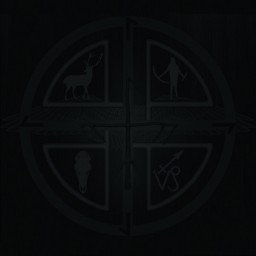
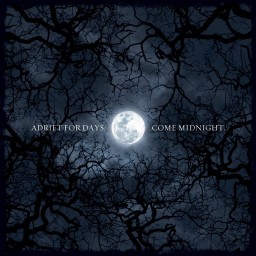
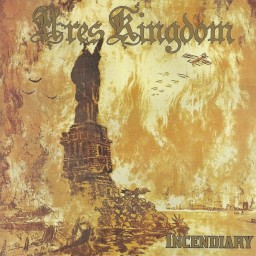
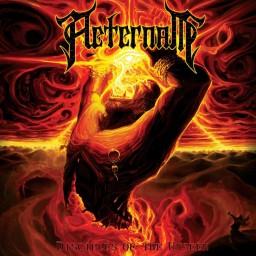
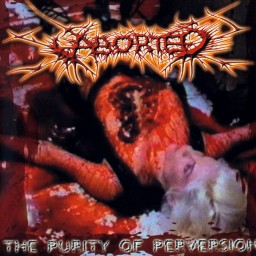
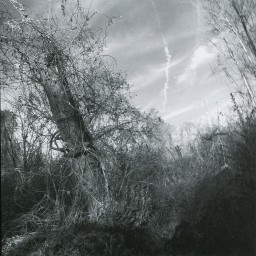
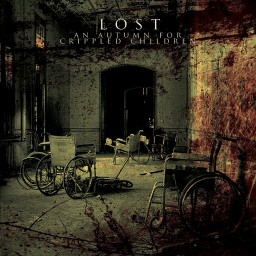
![16[485]](https://metal.academy/uploads/releases/76724859231e05ec46bbf72a4d9fb3d4.jpg)
